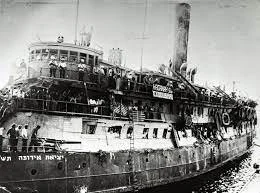A Woman’s Brief #5 - A PERSISTENT PAIN
It persists, this occasional pain I get in my belly, just to the right of the proof-of-birth button I bear. When I mentioned it to a doctor once, he laughed and said, “There’s nothing there to hurt.” He may be right, he with the informed opinion, but when it does, it does.
It persisted, that feeling of pain felt first by 110 African young adults and children from a variety of tribes brought to America on a southern gentleman’s whim and his sturdy 86’x23’ double masted schooner, the Clotilda, disguised as a lumber carrying vessel. They felt it, those borrowed young people from what we now call Benin.
In a 1927 interview with author Zora Neale Hurston, Cudjo Lewis remembered the Clotilda. He remembered the morning he woke early to a violent raid on his African village. The king of another tribe had come to capture his people and sell them into slavery. Lewis was tied in a line with dozens of others and marched for days to reach the coast where they were placed in a slave pen till the white man came to buy them. Moved to the ship, they all were all stripped naked, and herded below decks, laid out in darkness, close, like strips of bacon in a southern gentleman’s breakfast pan.
“We all lonesome for our home,” Cudjo said. “We doan know whut goin’ become of us, we doan want to be put apart from one ’nother.” Sixty-seven years later, he spoke of persisting pain.
Mocking the 1807 “Act Prohibiting Importation of Slaves,” wealthy Timothy Meaher wagered "a thousand dollars that inside two years I myself can bring a shipful of niggers right into Mobile Bay under the officers' noses." That he did.
The Clotilda, I read, carried 125 barrels of water, 25 casks of rice, 30 casks of beef, 40 pounds of pork, 3 barrels of sugar, 25 barrels of flour, 4 barrels of bread, 4 barrels of molasses, 80 casks of rum, 25 casks of ‘dry goods and sundries,’ $9,000 in gold (today $185,000) intended for the purchase of 125 Africans, and a crew thinking they were delivering lumber to the Danish Virgin Islands. (And I complain about stowing three dock carts fully loaded with supplies for two weeks aboard PineAweigh)
Provisions intended for the 45 day return from Africa were hidden by stacks of lumber that would later be used to build the planks and platforms for the captives’ “beds.” The ship set sail on the night of March 3, 1860. (See on-line, “Black Past” article written by Catherine Roth, December 19, 2009)
Two and a half months later, the wager was won. He did it, Timothy Meaher did. He built the ship and disguised its purpose. He had the captain, William Foster, burn the stinking thing (a dead giveaway, that smell of human cargo) in the Mobile Bay after off-loading his living cargo, adding 110 to the 3.9 million slaves already in America—nearly half a million in Alabama—according to the 1860 census. Let me tell you, black lives mattered between 1600-1860. Oh, how they did.
Meaher sold some traumatized black bodies to neighbors, shared some with his brother, James, and kept sixty for himself. What a coup. What a money maker. Let’s laugh with Timothy at the ease with which he broke the law; with which he broke the hearts of people like himself—but wait, not like himself: not white, not of European descent, not English speakers, not Christian, no longer known by names. Who knew the intelligence or skills of these somewhat-people? Who noticed their pain? Did they have souls? Who cared?
African-now-American offspring, that’s who care; those told the stories, those charged with carrying painful memories, those who first walked, and later drove, Meaher Avenue, the main street of Africatown, a slave colony three miles north of Mobile, established on land sold them by Master Timothy Meaher in 1865 to emancipated slaves when they hadn’t the money to return to Africa. Generation after generation, the pain has persisted, pain inherited by the telling of a talk, and by the refusal of generations of the Meaher family to acknowledge it.
“There’s nothing there there,” claimed descendants of Timothy Meaher. What Clotilda?
“There’s nothing there to cause that persistent pain, simply nothing there to hurt,” was the generational talk of Alabama’s prominent Meaher family, denying, and holding tight to Meaher’s personal papers, disregarding the United States government’s 19th century attempt to charge Meaher with smuggling (such smuggling was punishable by hanging), but stuff like the Civil War got in the way of prosecution; even though two years before his death in 1890, Timothy Meaher bragged about his slave trading skills in a newspaper interview. Some laws are laughable, made to break, right?
But then, on May 22, 2019, the Alabama Historical Commission announced that the wreckage of the Clotilda had been found in shallow water of Mobile Bay. There is a there there.
Families of Africatown have found relief with the finding of their ancestor’s slave ship. And while descendants of Timothy Meaher can no longer deny the reality of the Clotilda, from reports I read, the notable Meahers of Alabama will not speak “about their ancestor’s crime,” or release his personal papers. Pain persists.
“Where does it hurt?”
“There.”
“There? There’s nothing there, there.”
But, there is pain, there.”
“We don’t want to talk about it.”
(For further information see:Diouf, Sylviane A. (2009). Dreams of Africa in Alabama: The Slave Ship Clotilda and the Story of the Last Africans Brought to America





